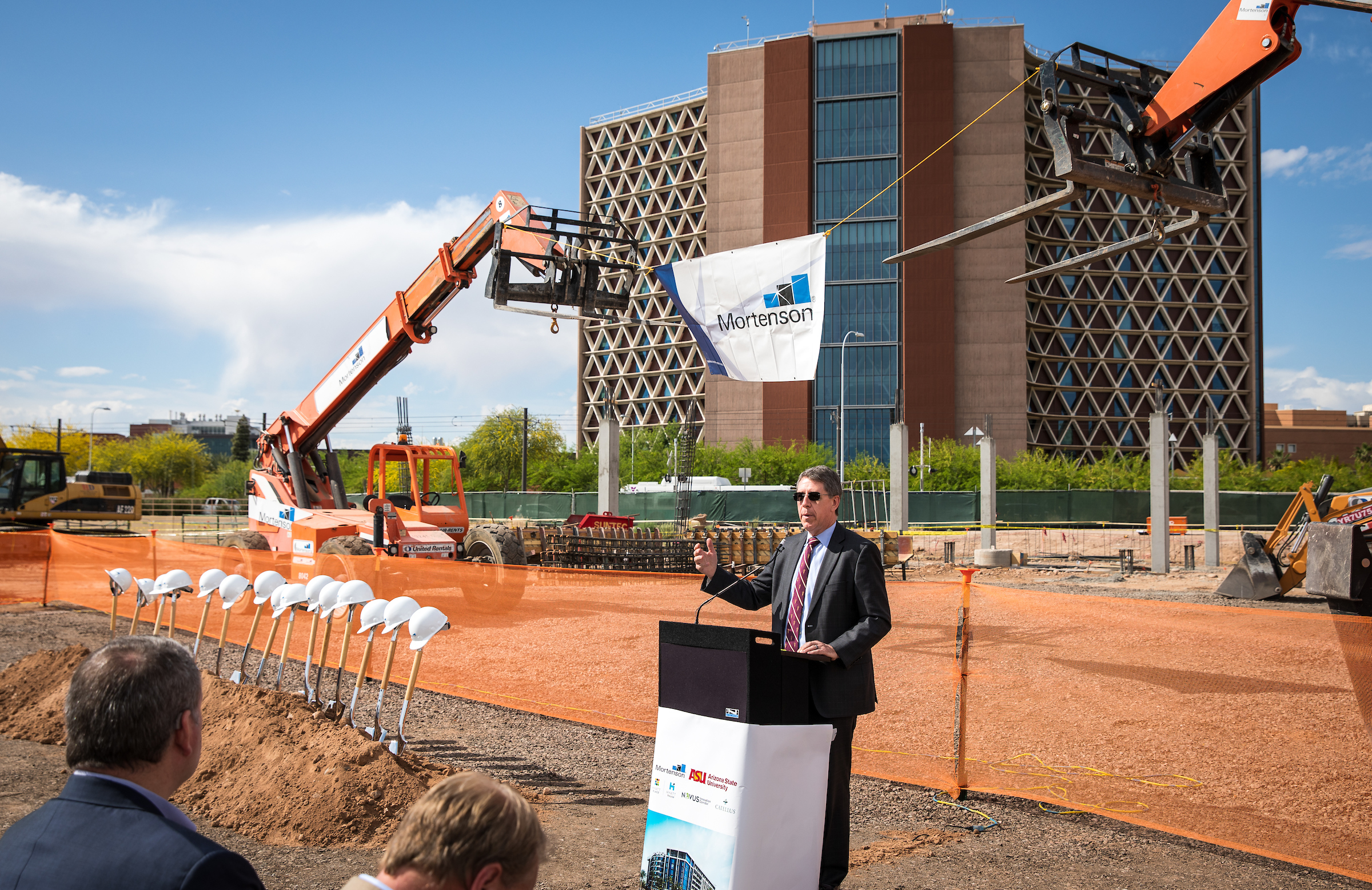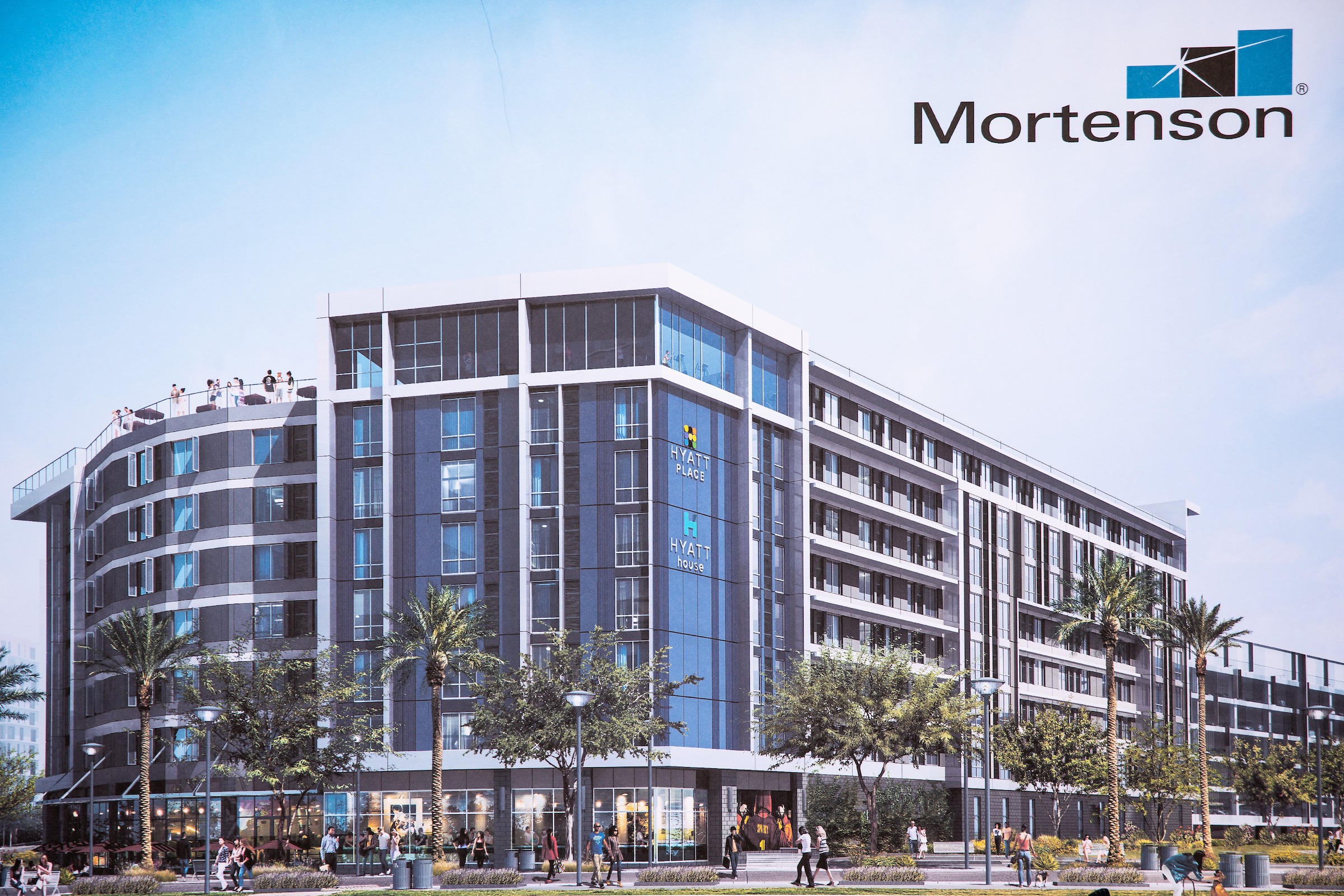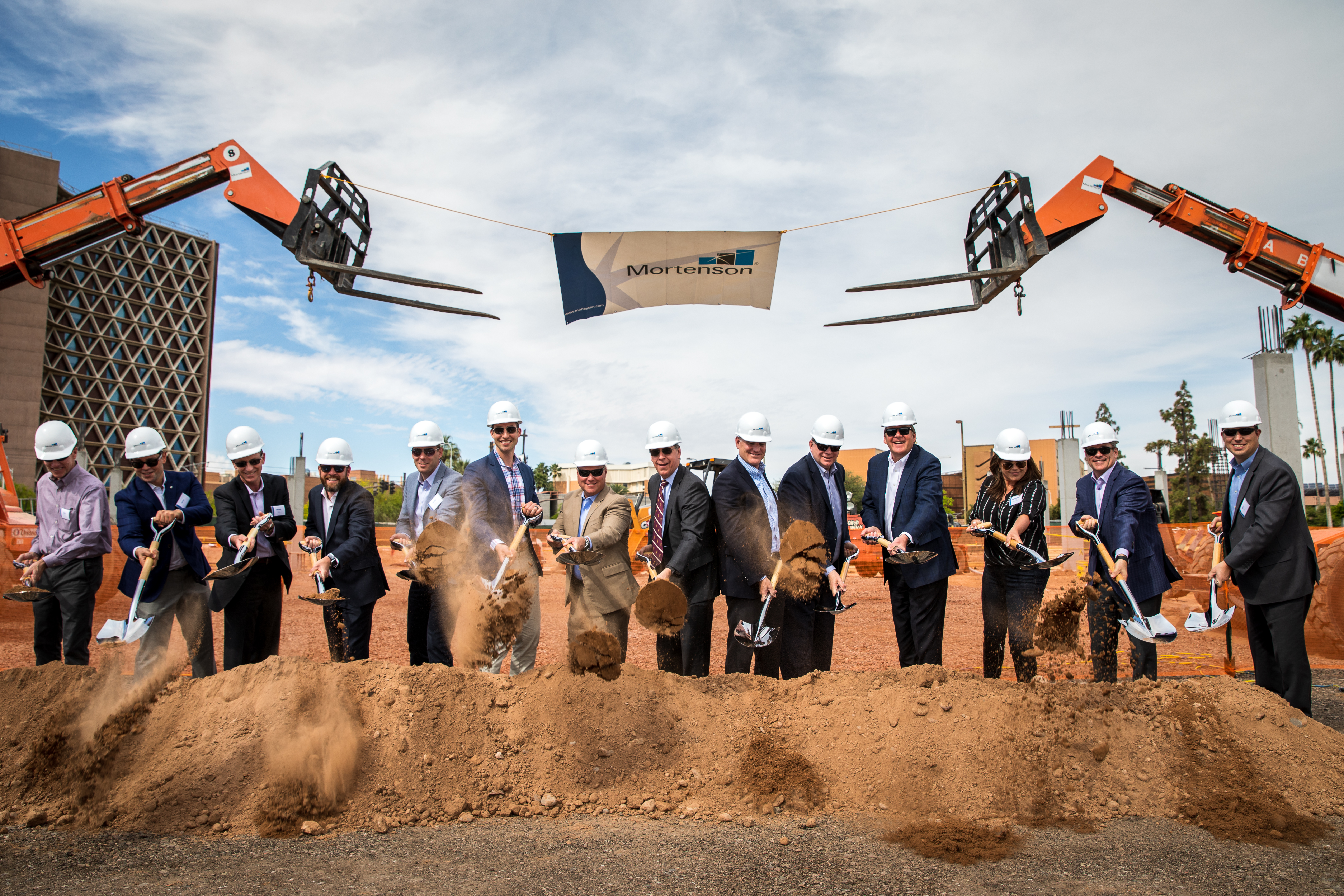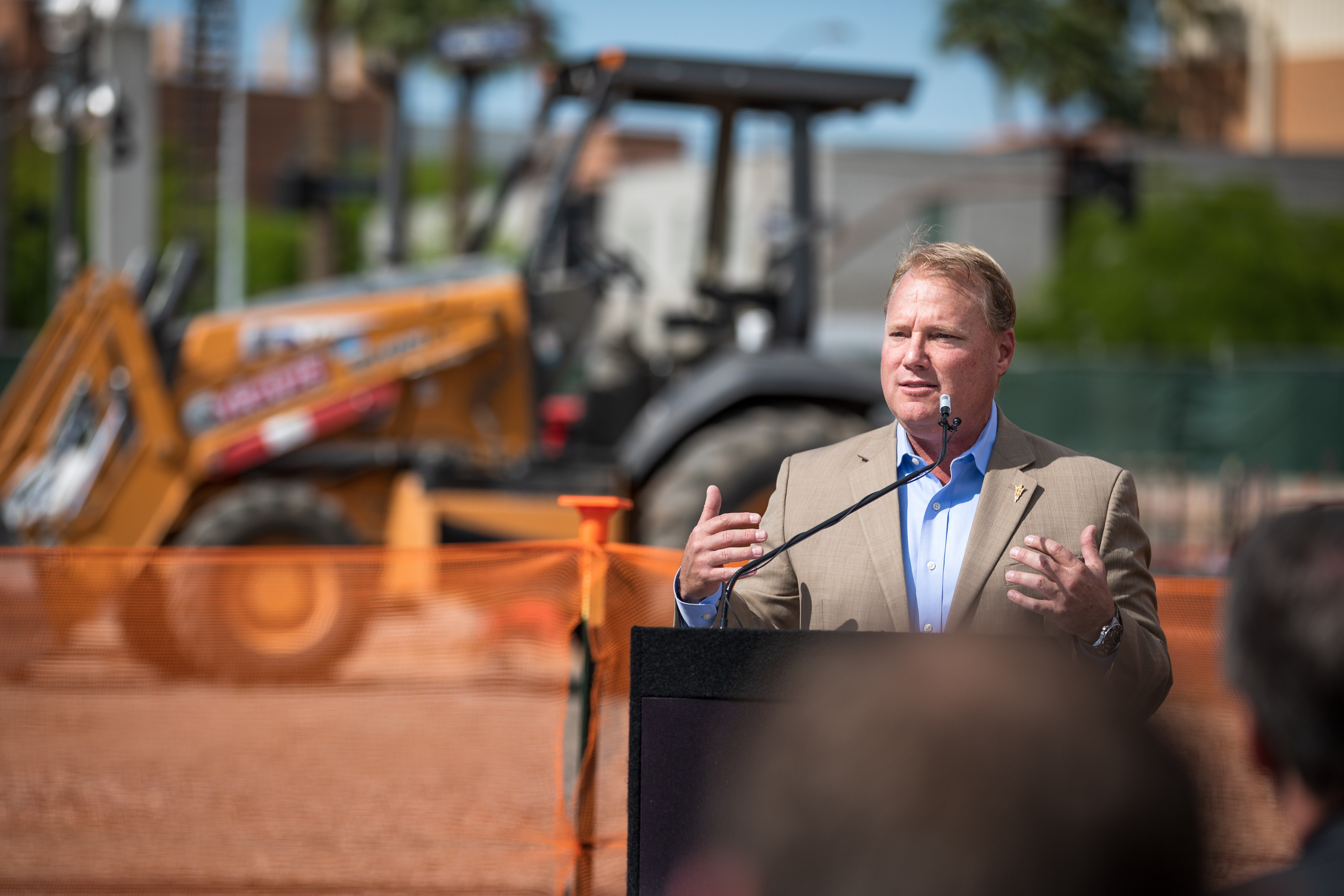Innovative Novus project enters its next stage of development
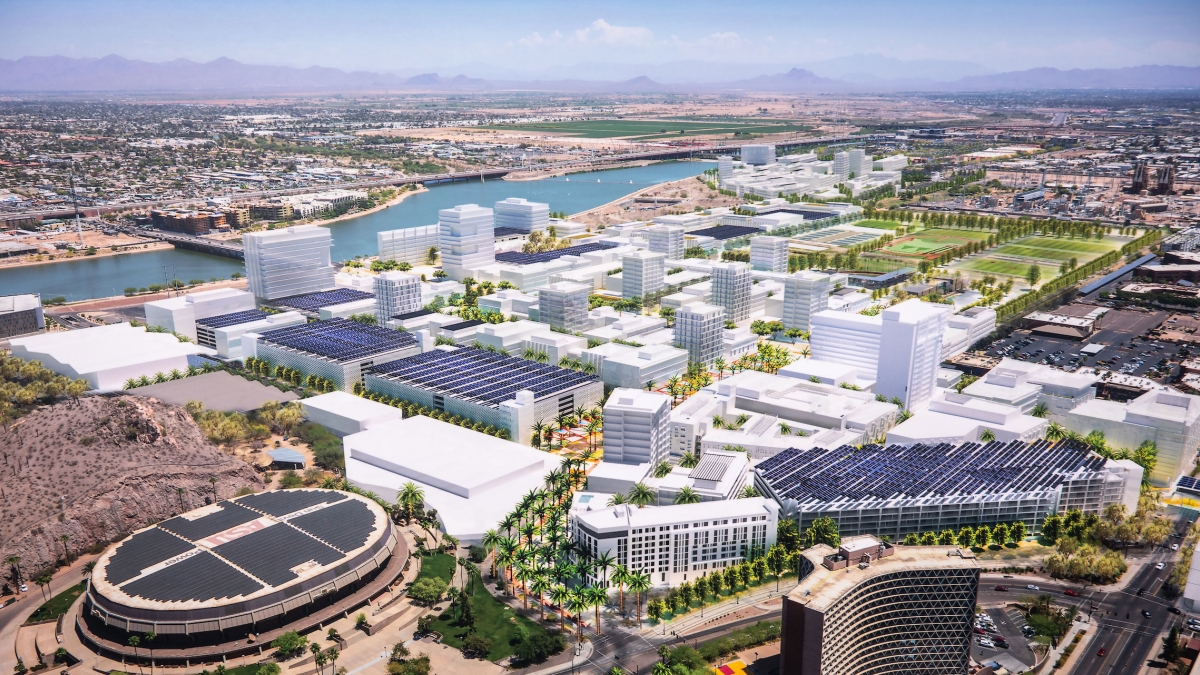
Editor's note: This story is being highlighted in ASU Now's year in review. Read more top stories from 2019.
The new hotel going up northwest of University Drive and Rural Road is part of a reimagining of the north part of the Arizona State University campus in Tempe that will draw corporate partners to the university’s knowledge enterprise, according to the chief financial officer of ASU.
“Clearly we believe this is a fantastic real estate location, but it’s so much more than that in terms of the partnerships and relationships that we foster,” Morgan R. Olsen said at the hotel’s groundbreaking ceremony on Tuesday. The hotel, a combination Hyatt House and Hyatt Place, will be directly across the street from Wells Fargo Arena.
“We’re the largest research university in the country, and we’re increasingly global,” said Olsen, who is also university executive vice president. “It’s a knowledge-based economy. That’s our fundamental core business.”
The groundbreaking marks the first project in the third phase of the Novus Innovation Corridor. The third phase will include the 259-room Hyatt hotel with a rooftop pool, as well as a six-story apartment complex focused on working professionals and an L-shaped, Class A office building that will sit just off the northwest corner of University Drive and Rural Road. The apartment and office buildings will have restaurants and retail shops on the ground floor.
The Novus Innovation Corridor is a 350-acre public-private partnership that will eventually include nearly 10 million square feet of office space, apartments, hospitality, retail and an athletics village with fields and a tennis facility.
Morgan Olson, ASU's executive vice president, treasurer and CFO, speaks at the groundbreaking of the Novus Innovation Corridor's dual-branded Hyatt Place and Hyatt House facility on April 23 in Tempe. Photo by Charlie Leight/ASU Now
Olsen said the project has evolved over time from a focus on funding athletics to creating collaborations to tie into the university’s mission.
“Part of this is intercollegiate athletics, but more important is what we do in terms of teaching and learning and research and collaboration with other organizations,” he said.
The first phase of Novus was Marina Heights, the lakeside development that includes the State Farm regional hub, and the second was the redevelopment of Sun Devil Stadium into ASU 365 Community Union, a year-round space that will host hundreds of events.
The next phase of the development is planned to be a creative office park at Rio Salado Parkway and Dorsey Lane, anchored by three large office buildings with affiliated parking. Novus hopes to attract large corporations interested in joining forces with ASU to advance collaboration and economic development. Marina Heights occupant State Farm already has partnered with the university in multiple ways.
Overall, Novus is projected to create 24,000 jobs and generate $4.6 billion in economic output at full build-out.
“Ideally, we’d like to leverage what our faculty are doing in laboratories, and it’s an opportunity for our students to learn and become entrepreneurs. This is a place for that to happen, and we think it’s part of the university’s mission to facilitate that,” Olsen said.
“Our charter is about assuming responsibility for the economic and overall health of our communities, and this is a physical manifestation of that.”
The eight-story, 259-room hotel, located on northeast corner of Veterans Way and Sixth Street in Tempe, is scheduled to be open in the summer of 2020. Artist rendering
The hotel-apartment-office complex on the northwest corner of University and Rural will be connected via a pedestrian bridge to the Interdisciplinary Science and Technology Building 7, which is being constructed on the southwest corner of that intersection. ISTB7 will house the Julie Ann Wrigley Global Institute of Sustainability, the School for the Future of Innovation in Society and research labs.
“We’re trying to make sure there’s a lot of connectivity between what happens on campus and in the Novus Innovation Corridor, literally and figuratively,” Olsen said.
“The south side (of University Drive) is where our faculty and others are working on discovering new ideas, and we hope we’ll see the application of those ideas on the north side.”
The Novus development, which could take a period of years to complete and will change the face of the Rural Road area south of Tempe Town Lake, had its origins almost a decade ago. In 2010, the state Legislature passed a bill allowing the three state universities to create athletic facilities districts. Jan Brewer, governor at the time, signed it into law. The concept allows private developers to build on university land, which is exempt from property taxes under the state constitution. In return, the companies make additional rent payments to the university in lieu of property taxes, and that money is spent on athletics facilities.
The master developer for the Novus Innovation Corridor is Catellus Development Corp. Charley Freericks, senior vice president of Catellus and an ASU alumnus, said that the multiyear completion timeline takes into account the natural ups and downs in a local economy. It is a project that has drawn national interest.
“There’s nothing like it in the country,” Freericks said. “There are smaller versions at remote and urban campuses, but it’s a rare opportunity to have 350 acres of land adjacent to a successful urban university. By land area alone, it’s bigger than anything in the country, and its urban setting, adjacent to freeway, rail and less than 2 miles from an international airport — you just don’t find this anywhere else.”
“Companies all over the region are drawn to being near ASU. They want to be near the employee generation that’s happening as you produce graduates. That’s the No. 1 topic for every company that’s relocated lately.”
Officials from ASU, Mortenson Construction, Catellus Development, the city of Tempe and Hyatt Hotels toss the ceremonial first dirt at the groundbreaking on April 23. Photo by Charlie Leight/ASU Now
Ray Anderson, ASU’s vice president for university athletics, said he was impressed by the plan when he came to ASU five years ago.
“I thought it was a very creative way of utilizing very valuable property around the university to create an urban work-live-play environment, with the thought that the in-lieu payments generated would go toward supporting expansion of athletics,” he said.
Changes to Sun Devil Athletics facilities include:
• A new 4,500-seat multipurpose arena for the hockey, gymnastics and volleyball teams, to be built near Wells Fargo Arena, which will be renovated.
• A new Athletic Village, which will include a track and field facility, multipurpose fields for intramural student sports and intercollegiate use, and a tennis facility. Karsten Golf Course will close next month to make way for the village and other future developments. The site of the current tennis courts, on the northwest corner of Rural Road and Sixth Street, ultimately is slated to become apartments.
• Renovations and a new clubhouse and practice facility at Papago Golf Course, now home to the Sun Devils men’s and women’s golf teams.
Anderson said that the football stadium renovation and new facilities have boosted recruiting.
“But it’s also a strong indicator to the other student-athletes that the new facilities are on the rise and not just an empty promise,” he said.
Olsen said that other universities with high-level athletics programs get state money for facilities.
“That would not happen in our state, so this is the tool that the governor and Legislature provided to us,” he said.
The goal is to create a project that will thrive for decades.
“Ideally, we want this to reflect the best principles of sustainability and new urbanism,” Olsen said.
“We want people to live close to where they work, so they have to be attracted to the amenities that are provided.”
"This Novus Innovation Corridor builds on the work that we have been doing in the city of Tempe for many decades," Mayor Mark Mitchell said Tuesday at the groundbreaking. "Our investments in Tempe Town Lake, light rail and the street car that’s now under construction have made this type of project a reality for everyone here. This will provide the lifestyle experience that fits into our urban core in the city of Tempe." Photo by Charlie Leight/ASU Now
Tempe Mayor Mark Mitchell said that Novus is the latest in decades of collaboration between the city and ASU.
“Think about Tempe Town Lake — when I was a kid, it was a dry riverbed. It was landfill,” he said.
“It took an idea from an ASU class and the vision from the city, and then working with state and federal entities, to make that dream a reality,” he said.
“We funded it up front and people were like, ‘Oh my gosh.’ Well, since the lake’s inception, there has been $1.7 billion of capital investment around the lake and 40,000 people live and work there.”
Top image: An artist's rendering of the Novus Innovation Corridor.
